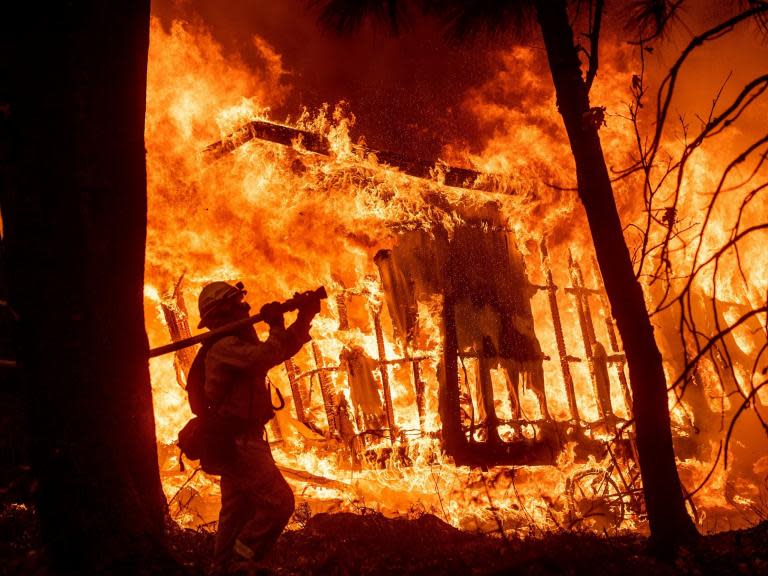We are 12 years from potential climate catastrophe – here’s how we can walk back from the brink
“It is existential.”
It was all the Fijian prime minister needed to say, when I asked him about climate change, after the most powerful cyclone ever recorded in the southern hemisphere had destroyed his and neighbouring islands back in 2016.
We now need to wake up to the fact that the rest of us are not so far behind. This year, hundreds of extreme weather events – record heatwaves, floods, droughts and storms – affected hundreds of millions in every region of the world.
The risks to food, water and energy security are almost impossible to overstate. The poorest countries will be hit hardest. But in our globalised economy every single supermarket shelf relies on daily deliveries from around the world. As Martin Wolf said recently: “It is five minutes to midnight on climate change … we are risking a world of runaway – and unmanageable – climate chaos.”
We have had 1C of warming since the 1850s, but this could dramatically accelerate to 1.5C in the next 12 years, which could mean irreversible loss of ice sheets, resulting in multimetre sea level rise.
Beyond 2C of warming, all bets are off. The world’s coral reefs will all be dead, hundreds of millions more will suffer compared to 1.5C, and there will be unimaginable impacts on the natural world and ecosystems on which we depend. Scientific research says this could happen within the next 12 years and based on UN projections, if we continue on our current path, we would need two Earths to keep up with consumption and population growth.
So we must act now to prevent disaster later.
What, then, must we do differently?
New approaches in politics, economics and society are critical. On one level, climate change is the most complex global challenge in human history. On another level, it is simple: cleaning up the world economy will tackle climate change, while making us happier, healthier and wealthier. That looks like a good option.
Clean and sustainable energy, transport, agriculture and industry means cheaper energy, more and better jobs, cleaner air, better health and nutrition, more liveable towns and cities and an enriched natural environment. The low carbon sector is growing four times faster than the rest of the economy. It is an unbeatable innovation story.
Coal-fired power contributes to around 8 million premature deaths globally each year. Renewable energy is already cheaper than unsubsidised fossil fuels in most parts of the world: India will go from 50 gigawatts of solar and wind to 225 gigawatts in the next four years. The New Climate Economy estimates that simply by having more compact and coordinated cities we can save $17 trillion (£13.6 trillion) by 2050.
Meanwhile we must do much more to support the world’s poorest and most vulnerable, who did not cause this mess; and help those workers who will need to transition from old to new industries, learning lessons from the past.
Everyone must play a part. Children are showing parents the way with recycling and care for animals and the environment. Scientists must communicate evidence effectively. Media must report what is happening, especially in the poorest parts of the world. Businesses must clean up their supply chains and embrace a low-waste circular economy. Civil society must help every community engage and act. Governments must create frameworks that underpin these efforts.
There are many encouraging signs. On 26 November, we celebrated the 10th anniversary of the UK 2008 Climate Change Act – the world’s first climate legislation – and have since reduced carbon emissions per capita faster than any G20 country and had our first day without coal-fired power since 1882.
The UK boasts 40 per cent of the world’s offshore wind capacity. Last month I met the premier of Taiwan who wants to replicate our experience, drawing heavily on UK expertise, generating up to £900m of contracts for UK business.
The UK’s world class ecosystem of science and research, innovative local and national government, NGOs, entrepreneurs, environmentalists, and even my own organisation’s world-first network of climate and energy diplomats mean that we can be a global green hub, exporting low carbon knowledge, products and services around the world. Recently I launched Climate Partnerships with Colombia and Mexico that will support billions of pounds of sustainable investment.
But there is so much more work to be done, at home and engaging countries around the world.
This week’s UN COP24 climate change conference in Poland must agree a single “rulebook” to enable all countries to measure and monitor climate action going forward; and countries must commit to further raise their ambition. For our part, early next year, the Climate Change Committee will advise the UK Government on the right long term goal for our country and by when we must be “net zero emissions”.
This is a global challenge across finance, health, education, energy, agriculture, industry, housing and transport. In the UK, it requires citizens, business and government to come together as we did in 2008 to achieve the world’s first Climate Change Act, but on a much bigger scale.
We have to be honest about the damage we have done, and the scale and urgency of the challenge. But we also have to be energised to act, for the sake of our children and future generations. We can and must move from an approach that destroys our ecosystem, to one that thrives within it.
Nick Bridge is the foreign secretary’s special representative for climate change. Follow him on Twitter: @FCOClimate

 Yahoo News
Yahoo News 

